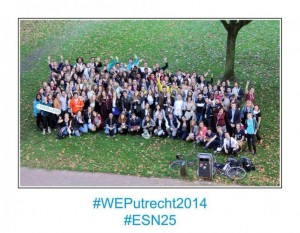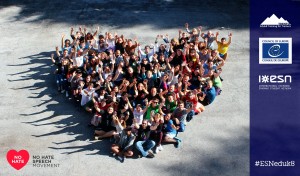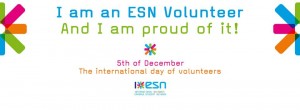 It often happens to me that the answers to my most pressing questions are actually right under my nose. This was the case for my research project as well. After a series of unfortunate events, I decided to give up the placement at the Romanian embassy and go for a full year at the University of Potsdam. However, this meant I would no longer be able to pursue my initial research idea, as I had no clue where to find subject participants, how to go about doing research and overall – how to start all of this? A newbie in a yet another foreign country, difficulties with the language, and on top of everything the challenge of having to start over thinking about a new YARP…
It often happens to me that the answers to my most pressing questions are actually right under my nose. This was the case for my research project as well. After a series of unfortunate events, I decided to give up the placement at the Romanian embassy and go for a full year at the University of Potsdam. However, this meant I would no longer be able to pursue my initial research idea, as I had no clue where to find subject participants, how to go about doing research and overall – how to start all of this? A newbie in a yet another foreign country, difficulties with the language, and on top of everything the challenge of having to start over thinking about a new YARP…
So where could I find subject participants, research something original that I was fascinated in, while at the same time assuring a balance in my life? The answer was quite clear – I will focus my project on the volunteer work I do for the Erasmus Student Network. Beginning with July, I have started being the Vice Chair for the International Committee for Education of the Erasmus Student Network (ESN) International and since then learned quite a lot in terms of promoting student mobility, advocating for better education policies on a European level and assuring that the voices of young, mobile people are being heard by important European stakeholders…I’ve been travelling at least once per month for conferences and international events and got the chance to meet so many young, intelligent, mobile people from all over Europe. Furthermore, with 2014 being such a profoundly celebratory year – 25 years since the fall of the Berlin wall, 25 years celebration of ESN and for me personally 25 years since the Romanian Revolution – I felt the urge to explore the meaningful topic of European identity.
It is rather fascinating how quickly and completely this organisation can foster a sense of community and togetherness and never in my life have I ever been exposed to such an environment where there are at least 3-4 languages spoken in your surroundings and everybody has the same sort of mindset and the same passion for education, mobility and Europe…If you want to have a small insight into this, watch this video, it is one of the best descriptions…But there are a few questions that made me think:
– Do we all understand the same thing when we identify ourselves with Europe? How do we define European Identity and should I provide different definitions of it, would there be an overall agreement on one particular definition?
– Are we all united in diversity, as Europe imagines us, or are we in the end just the young version of “European elites” that have had the access to this type of living, but not necessarily represent Europe? I surely hope it is not so, but I think it would be worth having look at this. If this is not true, what then stimulates us so much into claiming we are European and acting on it at the same time? Is there any particular pattern which could be investigated and put forward in order to stimulate and promote a better understanding of European identity and a better identification with Europe for other groups of young people?
– Thirdly, leaving myself out of the discussion, although I find it rather hard not to identify myself as a member of this organisation, what are the drivers of this organisation? How does the sort of “inside politics” of this organisation affect its members? Is this more of a political/social/cultural/educational organisation? Does this matter in the context of forming a European identity?
– What is the role of language in all of this – in terms of language diversity, but also use of language, by which I mean quite often inspiring discourses about what it means to be a volunteer/an Erasmus student/a European.
These are all questions that came up after closely observing this organisation and having quite a lot of discussions with its members. I will further on try to implement my strategies in order to actually get concrete answers to these questions, which I assume will be more challenging than I previously thought it would because of two main reasons:
– It appears that ESNers are actually quite reluctant to including your own research projects into the events’ agenda, as it would take time out of the important issues that have to be discussed about the network, which means that I will need to find other ways to do my research by avoiding using time out of plenaries…
– Fear of getting standardised answers – these people know how to talk and they would talk for hours and in 2-3 different languages if you let them (I know that, I am one of those them), but I need to be able to extract meaningful information from them.
Off to my new challenge – the Council of National Delegates meeting in Vilnius for ESN. Will be reporting more from that event. And here is an article on one of my latest ESN events I produced for ESN UK.



This looks like a very good start Oana and your questions are very helpful. It would be great if you keep records of your notes/ethnographic observation as you go along and if you familiarise yourself with the literature on ‘Anthropology of Europe’. The work of Bilge Firat on Turkish lobby in Brussels might give you some ideas about the methods and how to approach your topic.
Well done!
Marion.
Thank you for your suggestions, Marion! Your pointers regarding literature are very helpful!
I think the questions you pose are really interesting and the ENS will make for a fascinating case study. The one that particularly struck me was your comment about whether the ESN is simply producing a new generation of European elites. This also led me to wonder whether all EU nations are equally represented by/active within the ENS – in particular, I am wondering if the stereotype of the deep Euro-sceptic Brit translates into a less visible presence in the ESN. Finally, you touch on the notion of cosmopolitanism through your comments about how many language people speak, this might also be an interesting angle to pursue, especially as it may also be related to class/elite status.
Thank you for your comment. There a few interesting things to mention in relation to what you suggested actually:
-The question of representation is quite an interesting one in ESN. The thing is the voting functions in the following way – each country has an NR (National Representative), and he/she is supposed to represent the sections (one university registered with ESN is one section e.g. ESN Southampton, but also there are about 3 sections in Edinburgh for example). But at the same time each section has an individual vote. The number of sections varies from country to country. For instance Romania has 5 sections, whereas Italy has 50! ESN UK has 14 sections, one has recently been expelled, we were 15…Anyway, the thing is – Everyone agreed that it makes more sense to have the weighing of an NR vote 50%, because that person is way more knowledgable around what happens in ESN (often section presidents have no clue about what they’re voting for, there are people like that…) while at the same time maintaining the empowerment of sections, so their vote weighs 50% as well…The question is, in that case countries like Malta (2 sections) and Romania (5 sections) will be disadvantaged in terms of representation nationally, but in terms of representing the interests of particular sections it does make sense. It also makes sense not to give the full power to the NR, although this person is elected by the sections, because at the end of the day he/she might have a subjective vote as well…
– Regarding “Euroscepticism”, there are definitely no people like that in ESN. However, in ESN UK we struggle immensely to get people involved, whereas other countries such as Poland, Italy, Portugal, France, genuinely don’t know what to do with the number of active members…It’s really interesting to observe actually. I am at the moment considering applying for NR of ESN UK for next year and one of my main fears is working with people in ESN UK, because it is very difficult to get them to do something, and often the most active people in ESN UK are in fact not British…On a local level, we found it so hard to get home students to our events, even my “Modern Languages” friends were skeptical about being in an international environment, I have no idea why…While at the national level they are responsive(ish), but there are so many of them there just for the “fun” part…Which really disappoints me, especially as UK has so much potential (native English speakers, fame of a great country and culture), but people often tell me how disappointed they are with ESN UK (They’re more likely to tell me as I’m Romanian, than for instance Matt, our NR, although I’m from ESN UK 🙂 )
– Thank you for the idea regarding languages, so do you think I should look whether the knowledge of more languages is a consequence of people coming from an advantaged background?
It looks like your project is really shaping up and you have a lot of ideas to pursue. Just to add to what Claire and Marion have said, I like the idea of looking at how ESNers define European identity, and alongside that your interest in the “quite often inspiring discourses about what it means to be a volunteer/an Erasmus student/a European”. Instead of presenting people with different definitions of what it means to be European, you can start by keeping careful notes and records of those ‘inspiring discourses’ that are produced in public settings (like the conferences you are attending) or in response to questions you pose in your interviews/guided conversations. What kinds of words and phrases are used to describe European identity, or how is language used to inspire the volunteers or to reflect on their own roles and identities? Once you have a good collection of observations and notes you will start to see the patterns that emerge and be able to see what is most important to ESNers about ‘European identity’. You are in a unique position to be able to reflect on the organisation and the perspectives of other ESNers from the inside – looking forward to hearing more from Vilnius!
I will change the category for your posts to ‘Erasmus Student Network’ – hopefully they will all move across!
Thank you for your comment and suggestions, they are actually very helpful!
I was about to suggest the name change of the rubric, yes 🙂 Thank you for that as well!